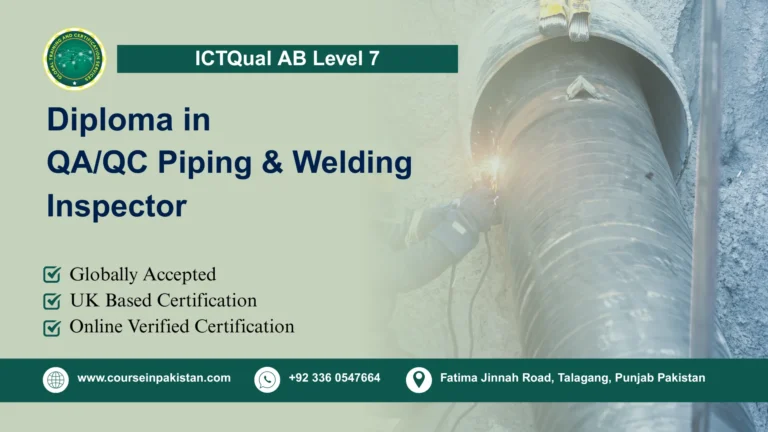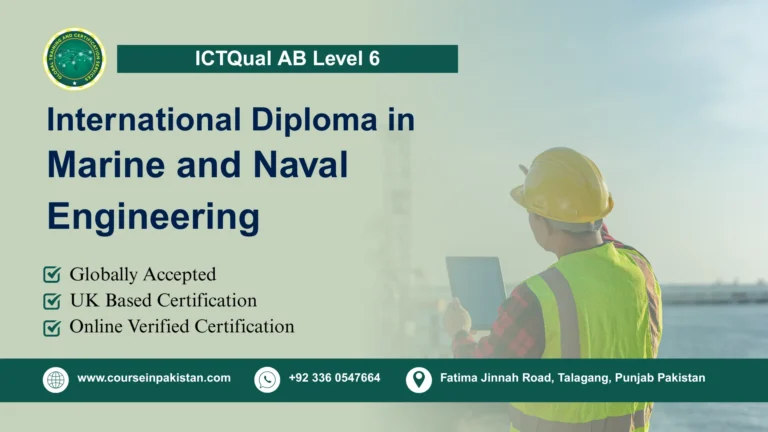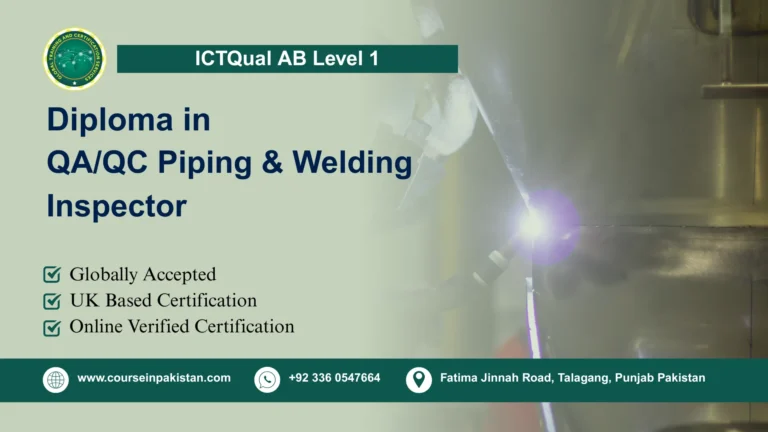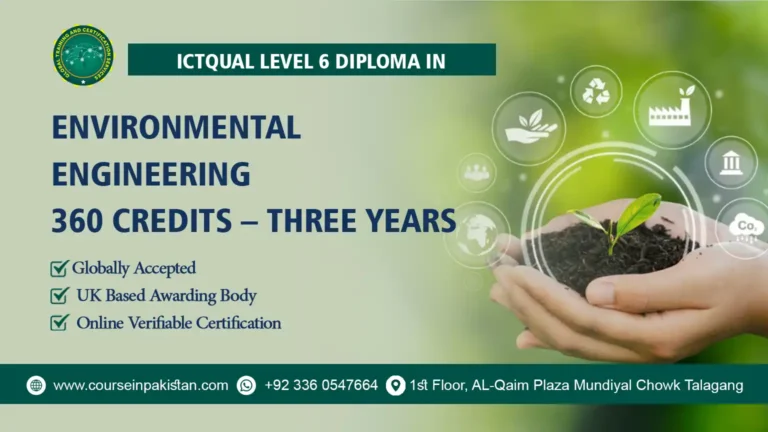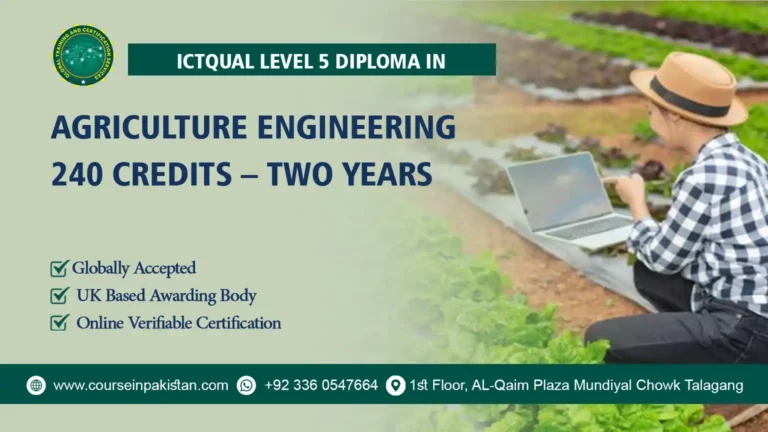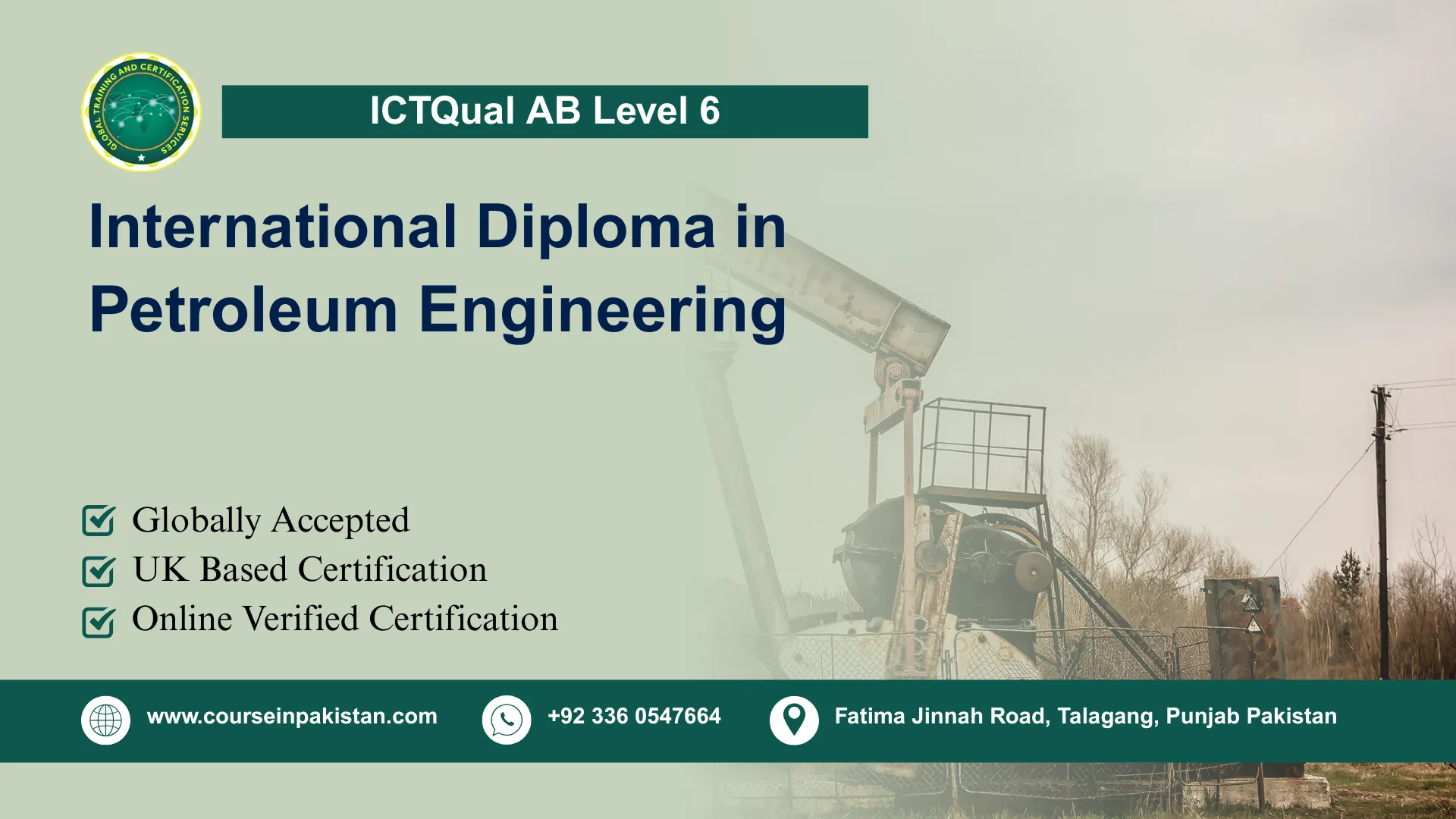
The petroleum industry is the backbone of global energy production, and highly skilled professionals are in constant demand to ensure safe, efficient, and innovative extraction and processing of oil and gas. The ICTQual AB Level 6 International Diploma in Petroleum Engineering is designed to provide learners with advanced knowledge, technical expertise, and industry-relevant skills required to excel in petroleum engineering roles. This internationally recognized diploma combines theoretical learning with practical industry insights, preparing graduates for leadership positions in exploration, drilling, production, and reservoir management.
Course Overview
The ICTQual AB Level 6 International Diploma in Petroleum Engineering is a 360-credit qualification that is entirely assignment-based, allowing learners to complete it at their own pace from anywhere in the world. This diploma is British Council verifiable, MOFA and Embassy attested, making it a valuable certification for employment and iqama approval in multiple regions.
This program is designed for both fresh learners and experienced professionals. Fresh students are required to complete all 36 mandatory assignments within a maximum period of 3 years. However, experienced and competent professionals with at least 6 years of verifiable relevant experience can achieve this qualification by participating in a professional discussion meeting with an ICTQual AB approved assessor, enabling them to complete the certification in a shorter time without completing all mandatory assignments. This unique flexibility ensures the diploma is suitable for individuals at different stages of their careers.
By offering both pathways, the ICTQual AB Level 6 Diploma not only strengthens professional credibility but also provides a streamlined route for career advancement in the petroleum industry.
Key Highlights
- 360-credit international qualification, fully assignment-based
- British Council verifiable, MOFA and Embassy attested
- Flexible learning: complete at your own pace from anywhere in the world
- Dual pathway: assignment route for fresh learners and RPL (experience-based) route for professionals
- Globally recognized certification for career progression and iqama approval
Course Benefits
1. Globally Recognized Qualification
- MOFA & Embassy attested for international acceptance
- British Council verifiable for authentication and credibility
- Widely respected in global oil and gas industries
2. Career Advancement Opportunities
- Opens doors to senior engineering and managerial roles
- Enhances employability in both national and international markets
- Provides competitive edge in high-demand petroleum engineering positions
3. Flexible Learning Structure
- 100% assignment-based – study at your own pace from anywhere in the world
- Suitable for working professionals balancing job and study
- Offers extended 3-year duration for fresh students to complete assignments
4. Dual Pathways to Achievement
- Fresh learners complete 36 mandatory assignments for structured learning
- Experienced professionals with 6+ years of relevant experience can qualify through Recognition of Prior Learning (RPL) and professional discussions
- Saves time for industry experts without compromising on quality or standards
5. Professional Credibility & Recognition
- Validates knowledge, technical expertise, and industry competence
- Builds confidence in handling complex petroleum engineering projects
- Increases recognition from employers, professional bodies, and regulatory authorities
6. Enhanced Technical & Practical Knowledge
- Comprehensive understanding of petroleum geology, drilling, production, and reservoir management
- Exposure to petroleum economics, safety, and environmental sustainability
- Prepares learners for real-world engineering challenges
7. International Career Opportunities
- Qualification recognized across oil-rich regions worldwide
- Facilitates iqama approval for employment in Middle Eastern countries
- Expands global mobility and access to international petroleum markets
8. Long-Term Academic and Professional Growth
- Serves as a foundation for advanced Level 7 Diplomas or Master’s degrees
- Strengthens eligibility for professional certifications in oil and gas management
- Positions learners for continuous career progression in the energy sector
Course Study Units
This qualification, the ICTQual AB Level 6 International Diploma in Petroleum Engineering, consists of 36 mandatory units.
Year 1 – Foundation in Petroleum Engineering
- Principles of Petroleum Engineering
- Engineering Mathematics
- Fundamentals of Mechanical and Electrical Engineering
- Introduction to Petroleum Geology
- Drilling Engineering Fundamentals
- Engineering Drawing and Computer-Aided Design (CAD)
- Basics of Reservoir Engineering
- Well Logging and Formation Evaluation
- Health, Safety, and Environmental Practices in Petroleum Engineering
- Communication and Technical Report Writing
- Introduction to Project Management in Engineering
- Introduction to Oil & Gas Industry Operations
Year 2 – Intermediate Studies in Petroleum Engineering
- Advanced Drilling and Well Control
- Reservoir Rock and Fluid Properties
- Production Engineering and Well Completion
- Petroleum Facilities and Pipeline Engineering
- Applied Thermodynamics and Fluid Mechanics
- Petroleum Project Planning and Management
- Oil & Gas Exploration Techniques
- Enhanced Oil Recovery Methods
- Industrial Maintenance and Reliability in Petroleum Operations
- Applied Research Methods in Petroleum Engineering
- Sustainable Practices and Environmental Management in Petroleum
- Oil and Gas Economics and Cost Control
Year 3 – Advanced Studies in Petroleum Engineering
- Advanced Reservoir Simulation and Modelling
- Petroleum Production Systems and Optimisation
- Offshore and Subsea Engineering
- Advanced Drilling Technology and Well Intervention
- Advanced Fluid Flow and Multiphase Systems
- Petroleum Safety, Risk, and Quality Management
- Smart Technologies and Industry 4.0 in Oil & Gas
- Robotics and Automation in Petroleum Operations
- Cyber-Physical Systems and IoT in Petroleum Engineering
- Professional Ethics and Sustainability in Petroleum Engineering
- Innovation and Entrepreneurship in Oil & Gas Technology
- Final Year Major Project (Capstone Project)
Learning Outcomes
This qualification, the ICTQual AB Level 6 International Diploma in Petroleum Engineering, consists of 36 mandatory units. By the end of each unit, learners will be able to achieve the following outcomes:
Year 1 – Foundation in Petroleum Engineering
Principles of Petroleum Engineering
- Demonstrate understanding of the fundamental principles of petroleum engineering
- Explain the role of petroleum engineering in oil and gas exploration and production
- Identify the stages of hydrocarbon recovery
Engineering Mathematics
- Apply mathematical techniques to solve petroleum engineering problems
- Use calculus, algebra, and statistics in engineering applications
- Interpret mathematical models in petroleum operations
Fundamentals of Mechanical and Electrical Engineering
- Understand basic mechanical and electrical systems used in petroleum engineering
- Apply knowledge of machines, motors, and electrical circuits in petroleum operations
- Relate mechanical and electrical concepts to oilfield equipment
Introduction to Petroleum Geology
- Explain the formation of petroleum reservoirs
- Identify rock types and structures associated with hydrocarbon deposits
- Apply geological principles to petroleum exploration
Drilling Engineering Fundamentals
- Understand the drilling process and types of drilling rigs
- Describe drilling fluids, equipment, and their functions
- Apply safety measures in drilling operations
Engineering Drawing and Computer-Aided Design (CAD)
- Interpret engineering drawings and schematics
- Create basic CAD models for petroleum equipment
- Apply industry-standard drafting techniques
Basics of Reservoir Engineering
- Explain reservoir properties and classifications
- Apply principles of porosity, permeability, and fluid flow
- Analyze reservoir performance using basic calculations
Well Logging and Formation Evaluation
- Interpret well logging data for formation evaluation
- Identify rock and fluid properties from logs
- Use logging tools and techniques for decision-making
Health, Safety, and Environmental Practices in Petroleum Engineering
- Apply safety standards and procedures in petroleum operations
- Evaluate environmental impacts of petroleum activities
- Implement HSE management practices
Communication and Technical Report Writing
- Write structured technical reports for engineering projects
- Apply professional communication techniques in the workplace
- Present technical data clearly to diverse audiences
Introduction to Project Management in Engineering
- Understand project management principles in engineering projects
- Apply scheduling and resource management tools
- Recognize the role of cost and risk management in projects
Introduction to Oil & Gas Industry Operations
- Explain upstream, midstream, and downstream operations
- Describe refining, storage, and distribution processes
- Identify stakeholders in oil and gas value chain
Year 2 – Intermediate Studies in Petroleum Engineering
Advanced Drilling and Well Control
- Apply well control methods to prevent blowouts
- Analyze drilling complications and solutions
- Operate advanced drilling systems under safety protocols
Reservoir Rock and Fluid Properties
- Evaluate reservoir rock characteristics and classifications
- Assess fluid behavior under different pressure and temperature conditions
- Apply PVT analysis in reservoir engineering
Production Engineering and Well Completion
- Explain well completion techniques and equipment
- Design artificial lift systems for production optimization
- Monitor and evaluate well performance
Petroleum Facilities and Pipeline Engineering
- Describe the design and operation of petroleum facilities
- Explain principles of pipeline construction and maintenance
- Apply safety standards in pipeline operations
Applied Thermodynamics and Fluid Mechanics
- Apply thermodynamic principles in petroleum processes
- Analyze fluid behavior in pipelines and reservoirs
- Evaluate energy efficiency in petroleum systems
Petroleum Project Planning and Management
- Develop project plans and schedules for petroleum projects
- Apply project monitoring and evaluation tools
- Assess risks and cost implications in petroleum projects
Oil & Gas Exploration Techniques
- Understand seismic and geophysical exploration methods
- Analyze exploration data for hydrocarbon potential
- Apply exploration tools for decision-making
Enhanced Oil Recovery Methods
- Explain secondary and tertiary recovery techniques
- Apply chemical, thermal, and gas injection methods
- Evaluate the effectiveness of EOR strategies
Industrial Maintenance and Reliability in Petroleum Operations
- Apply preventive and predictive maintenance techniques
- Evaluate equipment reliability in petroleum facilities
- Develop maintenance schedules to optimize performance
Applied Research Methods in Petroleum Engineering
- Apply research methodologies in petroleum projects
- Collect and analyze data using quantitative and qualitative tools
- Present findings in professional research reports
Sustainable Practices and Environmental Management in Petroleum
- Assess the environmental impact of petroleum operations
- Apply sustainable practices in oil and gas industry
- Implement environmental management systems
Oil and Gas Economics and Cost Control
- Analyze the economic viability of petroleum projects
- Apply cost estimation and budgeting techniques
- Evaluate financial risks in petroleum operations
Year 3 – Advanced Studies in Petroleum Engineering
Advanced Reservoir Simulation and Modelling
- Develop simulation models for reservoir performance
- Analyze production forecasts using software tools
- Optimize recovery strategies through simulation
Petroleum Production Systems and Optimisation
- Evaluate integrated petroleum production systems
- Apply optimization techniques to enhance production
- Monitor system performance and troubleshoot issues
Offshore and Subsea Engineering
- Explain offshore drilling and production systems
- Apply engineering principles in subsea operations
- Evaluate challenges and solutions in deep-water projects
Advanced Drilling Technology and Well Intervention
- Apply advanced drilling technologies in complex wells
- Evaluate well intervention methods for productivity enhancement
- Ensure safety and efficiency in drilling operations
Advanced Fluid Flow and Multiphase Systems
- Analyze multiphase flow in petroleum systems
- Apply fluid mechanics in oil, gas, and water flow modeling
- Optimize production under varying fluid conditions
Petroleum Safety, Risk, and Quality Management
- Apply risk assessment methodologies in petroleum projects
- Implement quality management systems in petroleum operations
- Develop safety frameworks to ensure regulatory compliance
Smart Technologies and Industry 4.0 in Oil & Gas
- Apply digital technologies in petroleum operations
- Use big data, AI, and IoT for operational efficiency
- Evaluate benefits of Industry 4.0 in oil and gas
Robotics and Automation in Petroleum Operations
- Explain the role of robotics in drilling and production
- Apply automation techniques for operational efficiency
- Evaluate safety and cost benefits of robotics in petroleum engineering
Cyber-Physical Systems and IoT in Petroleum Engineering
- Understand the integration of cyber-physical systems in petroleum operations
- Apply IoT solutions for data-driven decision-making
- Evaluate the impact of digital transformation in oil and gas
Professional Ethics and Sustainability in Petroleum Engineering
- Apply ethical principles in petroleum decision-making
- Recognize responsibilities towards society and environment
- Promote sustainability in petroleum engineering practices
Innovation and Entrepreneurship in Oil & Gas Technology
- Develop innovative solutions to petroleum industry challenges
- Apply entrepreneurial strategies in oil and gas ventures
- Evaluate feasibility of new technologies and business models
Final Year Major Project (Capstone Project)
- Design and execute a petroleum engineering project independently
- Apply research, analysis, and technical skills to real-world challenges
- Present professional project findings and recommendations
Ideal Learner
- Fresh graduates aspiring to build a career in petroleum engineering.
- Working professionals seeking formal recognition of skills and experience.
- Engineers aiming for international job opportunities and career growth.
- Individuals seeking a British Council verifiable and MOFA/Embassy attested qualification.
- Petroleum sector employees preparing for leadership and managerial roles.
Future Progression
- Entry into advanced leadership positions in the petroleum industry.
- Eligibility for senior technical, drilling, and reservoir engineering roles.
- Enhanced job opportunities in international oil and gas markets.
- Preparation for higher academic qualifications in engineering and energy management.
Academic Pathways
- Progression to Level 7 Postgraduate Diplomas in Petroleum, Energy, or Project Management.
- Eligibility for Master’s degree programs in Petroleum Engineering or Energy Studies.
- Direct entry to specialized professional certifications in oil and gas management.
Conclusion
The ICTQual AB Level 6 International Diploma in Petroleum Engineering offers a globally recognized and flexible pathway for learners at all stages of their careers. Whether you are a fresh graduate looking to complete structured assignments or an experienced professional leveraging your industry expertise, this diploma provides the knowledge, credibility, and international recognition needed to excel in the petroleum industry. By bridging academic learning and professional validation, this qualification empowers learners to achieve their career ambitions in one of the world’s most dynamic industries.

